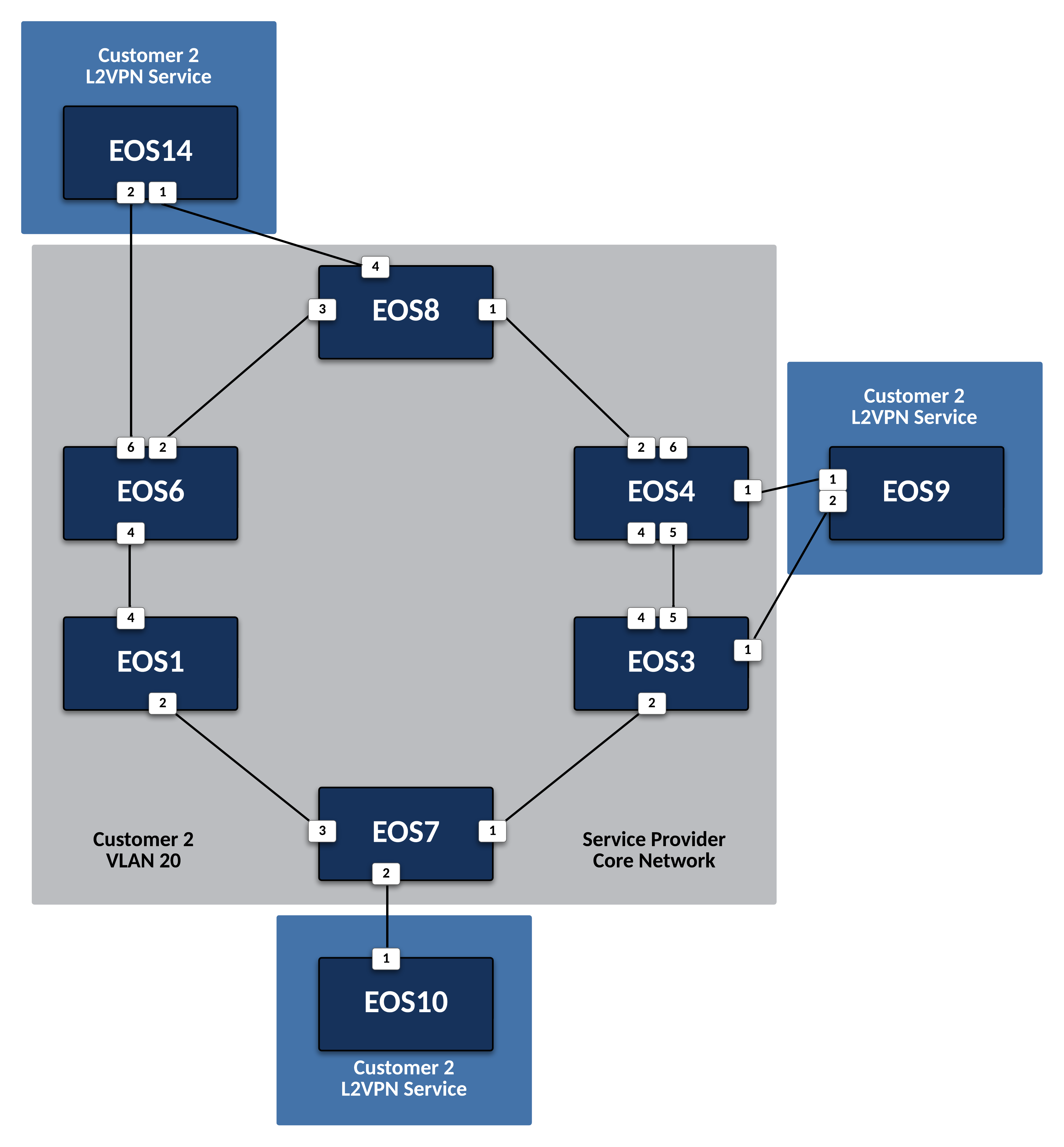Deploy L2VPN Services for Customer 2¶
Prepare for Customer 2 Layer 2 VPN E-LAN Services¶
-
On all PE nodes that are connected to Customer 2 CE nodes, create VLAN 20.
-
Define the VLAN 20 MAC-VRF.
- Route-Target for import and export should be 2:20.
- Route-Distinguisher should be
X.X.X.X:2(X = Node-ID). - Ensure that all known MAC addresses in VLAN 20 are originated/advertised via BGP to other PE Nodes.
-
Configure the appropriate interfaces on the PE Nodes as access (untagged) interfaces in VLAN 20.
-
Enable
EOS14andEOS9to be dual-homed to their respective PE nodes via an LACP port-channel.- Both links should be active for egress, as well as ingress traffic.
- MLAG must not be used to accomplish this task.
Configure the Customer 2 CE Nodes¶
-
Configure
EOS9,EOS10andEOS14to run OSPF process 200 in area 0. -
Advertise all connected interfaces into OSPF using a network statement.
-
Ensure all traffic to/from multi-homed L2VPN locations should be load balanced across all PE-CE links into that location.
-
Verify that
EOS3andEOS6should have the following output from a show l2rib input bgp vlan 20 command:Note
MAC addresses and Labels may differ in your output, this is ok. The key output is 2-way load balancing to MAC addresses that exist at remote dual-homed sites.
EOS3
0050.5625.975f, VLAN 20, seq 1, pref 16, evpnIntfDynamicMac Port-Channe 19 000c.29d0.de67, VLAN 20, seq 2, pref 16, evpnDynamicRemoteMac Load Balance entry: 2-way Label entry: 1040210 Tunnel IS-IS SR IPV4 (4), TEP 6.6.6.6/32 Label entry: 1040210 Tunnel IS-IS SR IPv4 (6), TEP 8.8.8.8/32 0050.561c.da4e, VLAN 20, seq 1, pref 16, evpnDynamicRemoteMac Label entry: 1040210 Tunnel IS-IS SR IPV4 (2), TEP 7.7.7.7/32EOS6
0050.5625.975f, VLAN 20, seg 4, pref 16, evpnDynamicRemoteMac Load Balance entry: 2-way Label entry: 1040210 Tunnel IS-IS SR IPV4 (6), TEP 4.4.4.4/32 Label entry: 1040210 Tunnel IS-IS SR IPv4 (3), ТЕР 3.3.3.3/32 000c.29d0.de67, VLAN 20, seq 1, pref 16, evpnIntfDynamicMac Port-Channel14 0050.561c.da4e, VLAN 20, seq 1, pref 16, evpnDynamicRemoteMac Label entry: 1040210 Tunnel IS-IS SR IPv4 (7), TEP 7.7.7.7/32 -
Confirm that
EOS9,EOS10andEOS14have formed OSPF adjacencies with each other. These devices should all be able to ping each other’s Loopback0 interfaces when sourcing the ping from their Loopback0 interface.
Success
Lab Complete!
